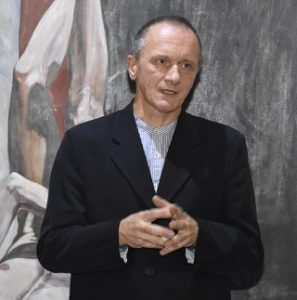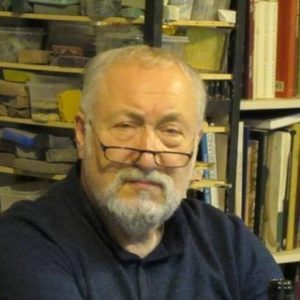The SACROEXPO exhibition’s gala ceremony held on June 10 is the occasion to recognise the outstanding artists – Marcin Bornus – Szczyciński, Tadeusz Boruta and Alexander Kornoukhov who are be presented the medals.
The gala awarding ceremony of the Pontifical Council for Culture’s Per Artem Ad Deum Medal presented by the Pontifical Council for Culture will be held within the scope of the International Exhibition of Church Construction, Church Fittings and Furnishings and Religious SACROEXPO.
The Medal bestowed to people who largely contribute to the to promotion of dialogue between the diversity of cultures in the contemporary world and thus promote man as an individual.
The Per Artem ad Deum Medal has been awarded for fifteen years at Targi Kielce staged gala ceremony.
The medal laureates are presented the distinction by the Chapter members and the church high-ranking dignitaries.
The medal has been awarded since 2005; since then it has been recognised as a very special distinction for artistic milieus whose works relate to sacrum and the Church.
This year the Medal Chapter is chaired by HE Bishop Marian Florczyk. The Per Artem ad Deum Medal has been bestowed upon the three people who represent different fields of art:
Marcin Bornus-Szczyciński is awarded the Per Artem ad Deum Medal for “tradition promotion and dissemination, for creating the space where spiritual and secular element are brought together”
He is one of the pioneers among Poland’s baroque music vocalists, a founder of the Bornus Consort ensemble. A graduate of the Economic Sciences Faculty at the University of Warsaw, for four years he worked as an assistant lecturer at the Faculty of Management at the University of Warsaw. Then he opted for a career change and resolved to work as freelance musician.
In 1986 he was awarded the French government scholarship to complete a master’s course at the Paris Conservatory. The founder of the Bornus Consort (1981) ensemble – Poland’s first attempt to reconstruct the genuine sound of a male chamber vocal ensemble with its specific vocal techniques.
The ensemble specialises in Polish polyphony characteristic for the turn of 16th and 17th centuries. He recorded for Polish Radioin additions to the works long-plays with works of Bartłomiej Pękiel, Piotr from Grudziądz, Mikołaj Zieleński, Marcin Mielczewski, all works of Wacław from Szamotuły, Polish Lent songs, chants about Saint Wojciech, Chansons et Motets, Media vita, et al.
He has performed in most European countries. Recently, he has been solely devoted to monody, especially liturgical monody. He calls himself a “traditionalist” rather than a musician as he has been into recognition, preservation and dissemination of various local traditions.
Tadeusz Boruta is presented the Per Artem ad Deum Medal for “creativity which spurs today’s man search for an individual relationship with God”
A painter and arts critic born in Krakow, from 1979 to 1983 Boruta studied painting at the Fine Arts Academy in Krakow and received his diploma at Stanislaw Rodziński’s and Zbylut Grzywacz’s workshop.
At the same time, in 1980 he also began philosophical studies at the Pontifical Academy of Theology in Kracow and graduated four years later. His painting often encompass religious themes, including Passion of Christ. In the 1980s, he was a part of the independent culture movement. In 1984 awarded the “Solidarity” Independent Culture Committee’s accolades at the “Around the Graphics” exhibition. In 1985 he won the 1st Prize at the First National Youth Biennale “The Way and the Truth”. In 1988 he was bestowed the Young Artistic Prize for 1987’s achievements.
He is the author of several problem-focussed exhibitions, including “Towards the Person” (1985), “All our Daily Things” (1987) in showcased in the cloisters of Dominicans Monastery in Krakow, the “Paschal Mystery” (1986) in the crypt of the Piarists church in Krakow, “Aus der Metapher heraus” (1990) in Darmstadt, “What is an artist worth in the times of misery” (1990) in Warsaw Zachęta galery and the National Museum in Krakow (1991), “I barbari nel giardino.
Mostra di pittura di artisti polacchi “in Bologna (1998),” Generation ’80. Independent young artists’ works in the 1980-1989 period” in Krakow (2010).
Alexander Kornoukhov is presented the Per Artem ad Deum Medal for “fusion of science and tradition expressed inspired art forms”
The most prominent present-day mosaicist, open to other religions and cultures as evidenced by his realizations in churches of different denominations.
The studios he works in are located studios in Moscow, Georgia, Ravenna and Rome. A laureate of many prestigious awards, world competitions including those in Ravenna (Italy) in 1986, the Golden Medal of the Russian Academy of Artists (2002).
The arrangement of the New Jerusalem mosaic made of 100 million elements in the Vatican chapel is his most famous achievement. The project is ranked among one of the most ambitious artistic undertakings of the 20th century.
(BS)



